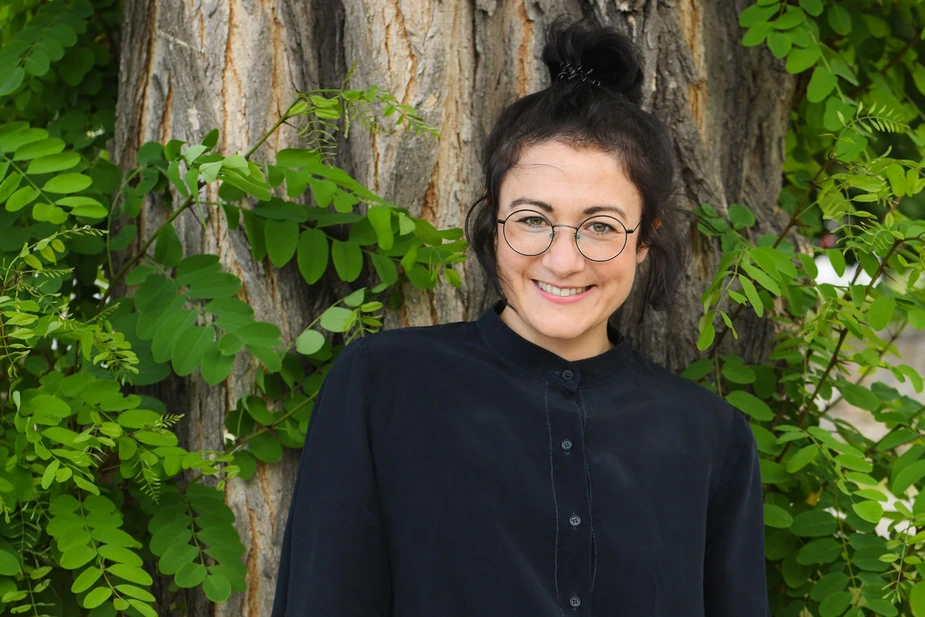She is not only passionate about sustainability issues, she lives them
In conversation with Magdalena Matheis, who is pushing green issues forward at WISTA Management GmbH
Magdalena Matheis is a staunch vegan, Adlershof’s health ambassador, an adherent to minimalist lifestyles, and a volunteer. Two year ago, the 36-year-old started to push forward green issues at WISTA Management GmbH. Since last autumn, she has been working as the full-time project manager of the Adlershof Technology Park’s operating company’s newly created sustainability team. She is currently acquiring the theoretical toolkit for this during a part-time master’s programme for sustainability and quality management at the Berlin School of Economics and Law. Her long-term goal is to establish a sustainability culture, not only in the company itself but across all WISTA locations. This will require a lot of staying power. Which is exactly what the Rhineland-Palatinate native also needs for practising CrossFit, the sport she fell in love with during her first trial class.
Adlershof Journal: For places of future innovation (“Zukunftsorte”) like the Technology Park Adlershof or the FUBIC Innovation Centre, which is currently under construction, a green image is compulsory and a key component from their inception. Creating a central office for sustainability at WISTA Management, however, is quite recent, isn’t it?
Magdalena Matheis: Yes, WISTA institutionalised the Sustainability project team this past October. Sustainability in all its facets requires a central agency where all the threads come together. We are not building it from scratch, however, we have already gotten many things done. We are now systematically bundling activities and are also taking economic and social aspects into account, in addition to ecology. This spring, we handed in WISTA’s first sustainability report in line with the German Sustainability Code.
What’s the status quo?
We have come a long way in the social dimension. Things pertaining to healthcare, equal opportunities, diversity, employee rights, and workplace safety. Ecologically and economically, there is a lot to build on. Examples are energy efficiency measures, sustainable construction like that of the Centre for Photovoltaics and Renewable Energy, LED lights in WISTA buildings. We see room for improvement, however, regarding a mobility concept, to name just one example of the energy-saving potential. Electric cars, charging stations, and a company travel policy, to name just a few, could contribute to making employees’ commutes carbon-neutral.
What are the next steps?
So far, the process included several individual employees from different departments. We now want to gradually integrate the whole workforce into the process. In addition to sustainability reporting, which will be done every two years, we are about to implement a management system that is tied into a continuous improvement process. In the medium term, we also plan to set up a quality management system.
A future sustainability strategy will go beyond WISTA Management GmbH?
That’s our goal. Our thinking goes beyond merely including WISTA.Plan and WISTA.Service, but to include our customers and cooperation partners, who we think are just as concerned about sustainability as we are.
How did the sustainability project come about?
Personally, I have been dealing with sustainability issues for many years. Working for WISTA Conventions, our events management service, I had been working intensely on what it means to create a more sustainable events sector. Conventions is now seeking to become certified as a listed partner of “Sustainable Meetings Berlin”. When the coronavirus pandemic began and the events department was forced to a standstill, I had the capacities, and the support of management, to work to make WISTA greener.
Do you live sustainably and how?
I don’t own a car and use public transport. I have been a vegan for many years. My aha moment was a documentation that looked at the links between nutrition, health, and ecology. I switched to a plant-based diet from one day to the next. I also refrain from using animal products in my clothing, cosmetics, furniture, and cleaning products. I free myself from clutter. I am the ambassador of Adlershof’s Health Network and a volunteer for environmental, climate and animal protection. One of the causes I support is the ProVeg association.
How did your professional career start?
I studied archaeology and political science in Kiel, followed by an apprenticeship as an events manager, and have now found my calling as a sustainability manager.
How do you spend your spare time?
I exercise a lot. My passion is CrossFit. It’s a mixture of resistance training, body weight exercises, and endurance training. A great way of training in a group that lifts my mood as well as my energy levels.
What else is on your wish list?
Personally, I would like to travel through Europe in a van and someday live in a tiny house in the countryside. For the world, I would like to see more empathy and acceptance for all people and their different lifestyles.
Interview by Sylvia Nitschke for Adlershof Journal
